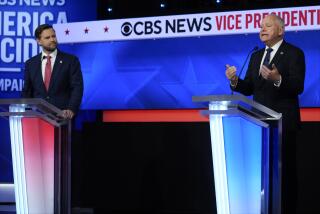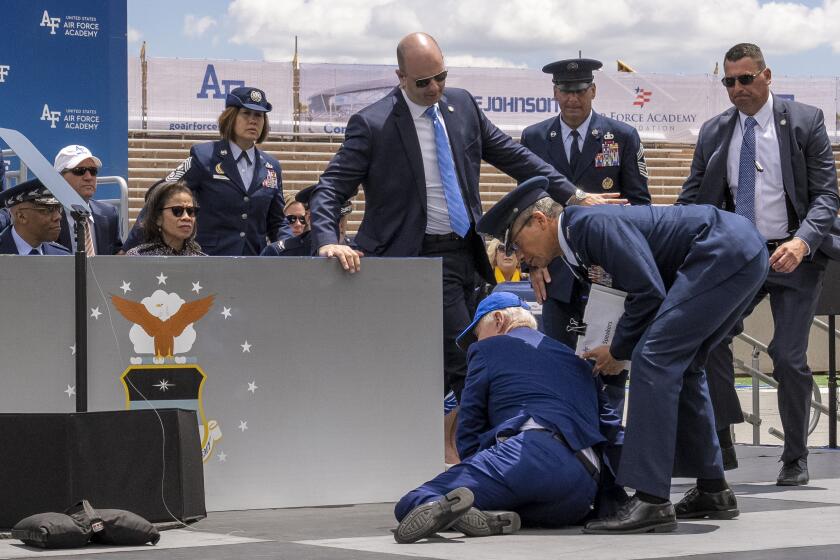Iowa is stormy, but debates rather calm
- Share via
DES MOINES — A Democratic presidential campaign that has become increasingly acrimonious softened Saturday night as seven of the party’s candidates took up issues considered important to African American and Latino voters.
The two-hour Brown & Black Forum was the second of two events on a wintry day in the Midwest that highlighted how close the major candidates are on many domestic policies, including immigration, poverty and healthcare.
But neither event appeared to open up any new ground for the presidential hopefuls in a state where Sen. Hillary Rodham Clinton of New York, Sen. Barack Obama of Illinois and former Sen. John Edwards of North Carolina are locked in a virtual three-way tie with a month to go before the crucial Jan. 3 caucuses.
With the focus on domestic issues, the Iraq war -- which has dominated the campaign -- was barely mentioned in the debate that was broadcast over cable channel HDNet.
The war didn’t play a significant role until the second hour, when it provided the debate’s only flash point.
Sen. Joseph R. Biden Jr. of Delaware brusquely dismissed a plan by Rep. Dennis J. Kucinich of Ohio to replace U.S. troops in Iraq with an international peacekeeping force.
“Who is going to possibly move in? This is ridiculous,” Biden said. Kucinich said it could be done by reaching out to the international community.
“I have,” Biden said.
“No, you haven’t,” Kucinich retorted as the two candidates talked over each other while one of the moderators, National Public Radio’s Michele Norris, tried to interrupt.
Obama seemed to be the crowd favorite in the high school auditorium where the debate was held.
He elicited sustained cheers at several junctures, particularly after his closing comments that drew on the legacy of the civil rights movement.
“I am standing here because somebody somewhere, at some point in time, stood up when it was risky, stood up when it was hard, stood up when it wasn’t popular,” Obama said. “We have to stand up on behalf of future generations, and if you . . . join me, I promise you we can change America.”
The debate format allowed each candidate to pose one question to any of the other candidates. Sen. Christopher J. Dodd of Connecticut sought to contrast Edwards’ anti-poverty stance, a key part of his campaign, with his vote in the Senate for the 2001 Bankruptcy Reform Act that Dodd said “drove a lot of working-class families into poverty.”
“I was wrong, and you were right, Chris,” Edwards said, defusing what could have been a contentious exchange. “Any of us who voted for it were wrong.”
Kucinich drew laughs when he asked himself a question: whether it was true that he was the only candidate at the forum proposing a universal, not-for-profit healthcare system to cover 46 million uninsured and 50 million under-insured Americans.
“It is true,” Kucinich said. “It’s time that we see healthcare as a basic right in a democratic society, not a privilege based on ability to pay.”
Clinton also drew laughs when she one-upped New Mexico Gov. Bill Richardson, the only governor running for the nomination, who asked her whether she thought a governor would make a good president -- a clear reference to her husband, former President Clinton, who remains a popular figure among African American voters.
“Well, Bill, I think they also make good vice presidents,” Clinton said, referring to speculation that Richardson, who is dragging in polls and fundraising, is angling to become the eventual nominee’s running mate.
The Brown & Black Forum was the last scheduled televised debate here before the Iowa caucuses, and the seven major candidates were on hand despite a driving ice storm that closed the Des Moines airport until mid-afternoon after a plane skidded off a taxiway.
Biden, who drove in from Chicago, arrived about 45 minutes after the debate started. The weather also delayed Clinton’s arrival in Iowa by several hours, forcing her to phone in to the afternoon event, the Heartland Presidential Forum, where Obama, Edwards, Dodd and Kucinich all spoke in person.
Clinton was booed by some in the left-leaning audience -- the only candidate to get such a reception -- when she declined to pledge to push for immigration reform during her first 100 days in office, saying only that she would make it a “high priority.”
That wasn’t good enough for Catherine Salgado of Chicago, a member of the Illinois Coalition for Immigration and Refugee Rights.
“We need a commitment,” Salgado said.
Jacqueline Herrera of Chicago, an immigration lawyer in the same group, said she believed Clinton had become less vocal about legalizing undocumented immigrants after the recent controversy over whether she supported granting illegal immigrants driver’s licenses, a proposal she eventually came to oppose.
“She’s a chicken,” Herrera said. “She’s being very political about it. She’s not being straightforward.”
The Heartland forum gave its warmest reception to Obama, who emphasized his post-college work as a Chicago community organizer.
“This idea of community values is not just the cause of a campaign for me,” Obama said. “It is the cause of my life.”
Speaking to reporters after the forum, Dodd added his voice to earlier criticism by the Clinton campaign over Obama’s plan to distribute 50,000 brochures urging students from Iowa who were away at college in nearby states to return home during the winter break to take part in the caucuses.
“To recruit people here . . . does great damage to the process,” Dodd said. “This is an Iowa process. If it’s going to be all of a sudden moving people all over the country to participate, you lose the credibility.”
Obama spokesman Bill Burton dismissed the initial Clinton complaint, reported by Politico.com, as “borne out of pure political frustration.”
“Iowans are determined to launch a winning candidate for the Democratic Party to bring real change for our country,” Burton said. “They will not be deterred by efforts to dampen participation and 11th-hour attacks.”
Edwards was the first to address the forum and pressed the anti-poverty theme central to his campaign by arguing that Americans’ lack of healthcare, environmental destruction and other problems can be traced back to political domination by multinational corporations and special interests.
“They have built a wall around Washington, and most of America is left outside that wall,” Edwards said. “It is the reason the poor, the uninsured, the disabled, the disenfranchised voices are not being heard in Washington, D.C. We’re going to tear that wall down.”
seema.mehta@latimes.com
Times staff writer Aaron Zitner contributed to this report.
More to Read
Get the L.A. Times Politics newsletter
Deeply reported insights into legislation, politics and policy from Sacramento, Washington and beyond. In your inbox twice per week.
You may occasionally receive promotional content from the Los Angeles Times.











